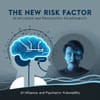Artificial intelligence is transforming mental healthcare by predicting crises with remarkable accuracy. A groundbreaking review led by Dr. Nchebe-Jah Raymond Iloanusi found that AI can predict mental health crises through social media analysis with 89.3% accuracy, often identifying warning signs 7.2 days before clinical detection, and sometimes even months in advance.
By analyzing subtle shifts in linguistic patterns, posting frequency, social withdrawal, and online behavior, AI-driven analysis can detect nuanced behavioral cues that are often invisible to the human eye. This enables AI platforms to identify individuals at high risk of mental health crises, facilitating early detection and intervention.
The benefits of AI in mental health are substantial. AI-based systems can prevent self-harm and suicide by identifying high-risk individuals earlier, improve treatment outcomes, expand access to care, and reduce healthcare costs. In fact, AI-driven interventions have been shown to double engagement with mental health resources, with 78% of users connecting to recommended support services compared to 39% using traditional outreach methods.
However, the use of predictive AI in mental health also raises critical challenges surrounding data privacy, consent, and ethical implementation. To address these challenges, careful collaboration is required among healthcare providers, policymakers, and technology platforms. Researchers, clinicians, and technology companies must work together to ensure the responsible development and deployment of AI in mental health.
As AI continues to evolve, it's essential to prioritize transparency, accountability, and patient-centered design in the development of AI-driven mental health tools. By doing so, we can harness the potential of AI to revolutionize mental healthcare while protecting the rights and well-being of individuals.


